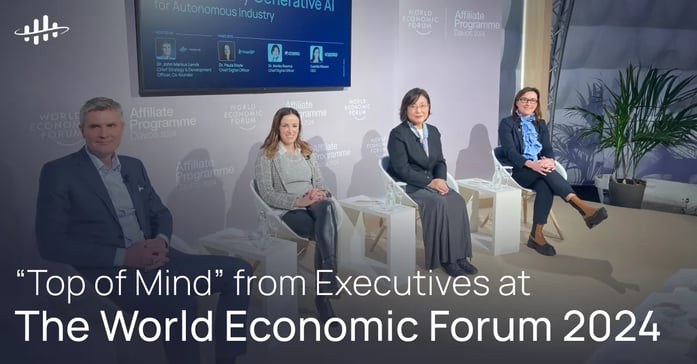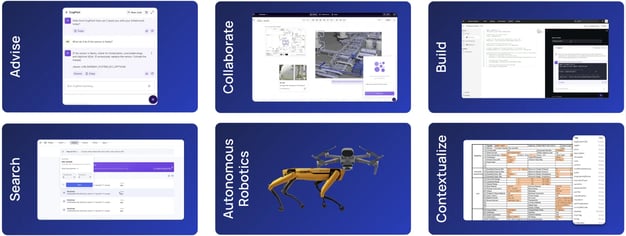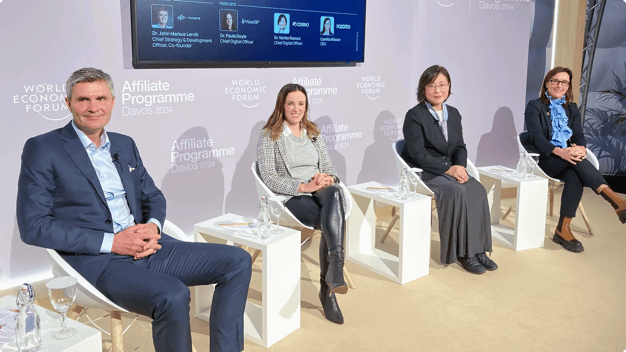
Global business and political leaders descended upon Davos, Switzerland, for the World Economic Forum last week to discuss pressing societal issues and identify potential solutions through the power of the collective. Unsurprisingly, Generative AI dominated keynotes, panel discussions, interviews, and casual conversation.
Cognite’s own customer panel, Trustworthy Generative AI for Industry, explored these topics with key insights from Dr. Paula Doyle, Chief Digital Officer at Aker BP, Dr. Noriko Rzonca, Chief Digital Officer at Cosmo Energy Holdings, and Camilla Nilsson, CEO at Kyoto Group. Discussion ranged from why data trust matters more than ever in industrial operations to how the panel expects to manage change across their teams and organizations as Gen AI technology matures and data security becomes more urgent.
Though there were more questions than answers across the forum, common themes persisted around the rapid expansion of AI and the need for strong activity guardrails and absolute trust in secure data that defines Gen AI outcomes.
The expansion and urgency of trustworthy data and AI
It is impossible to overstate AI’s impact on societal challenges, industrial operations, and the future of work: World and business leaders are navigating a fast-moving landscape. This shift demands immediate attention, and two things were obvious. First, organizations must prioritize making workers the center of gravity from the plant floor to the cubicle (or home office) as data becomes more democratized. Second, easy access to insights and data clarity has a real-world, bottom-line impact.
John Markus Lervik, Cognite Co-founder and Chief Strategy Officer, summarized the potential well: “Amidst a volatile world, there is a growing need for technology and collaboration - not only to meet climate objectives but also ensure we manufacture the goods and services that we need to navigate tricky geopolitics and supply chain issues.”
For industry, this step change in technology offers significant improvements to safety, reliability, and quality as workflows change and improve with simple access to complex industrial data. For example, digital technology is already central to Aker BP’s low carbon, low-cost strategy, with Dr. Doyle directly connecting it to their leadership in maintaining the industry's lowest CO2 emissions per barrel. Dr. Doyle sees Generative AI as key to improving productivity offshore and in the office by being able to achieve more in a sustainable manner.
Dr. Rzonca took this one step further, outlining Cosmo’s plans for deploying the next phase of their digital plant journey across three vectors: the physical operations, the processes, and the equipment. With Cognite, they are able to identify key opportunities in these three areas and expect to shorten their planning timeline by 2-4 years with simple access to complex industrial data and Generative AI.
Additionally, adopting AI in an assertive, pragmatic manner was top of mind for Nilsson: “As I am passionate about the energy transition and the 4th industrial revolution, it is particularly exciting to experience how those processes are now unfolding at an increasing speed and how widespread the impact AI will have on that evolution and our lives.”
These points well-capture the state of Gen AI for industry, where leaders are planning and investing strategically in the technology, given its rapid ascent last year with ChatGPT 4 and the latest class of Large Language Models (LLMs). The technology is moving fast and will be industry’s competitive advantage—or liability if not adopted or not trusted.

Building Absolute Trust in Data and Gen AI Outcomes
For many, AI is still perceived as a “black box,” making it difficult to fully adopt AI-based outcomes into mission-critical fields where safety and predictability are paramount.
LLM hallucinations and the frequent lack of a single source of truth make it difficult for front-line operators to trust the data and insights they are working with fully. Without complete trust, there can be no operational progress, and without operational progress, it will be impossible to increase productivity and meet urgent climate goals.
Intel CEO Pat Geisinger was very straightforward in an interview with CNBC, stating, “This next phase of AI, I believe, will be about building formal correctness into the underlying models.” As the hype created in 2023 turns into reality, executives across industry are settling on more realistic expectations around their data and Gen AI strategies:
-
Gen AI is not a silver bullet but a terrific pathfinder. As Gartner states, “LLMs will become the preferred interface to enterprise data.” But just as one might take a few Google queries to find what they are looking for, LLMs with industrial context will help SMEs and domain experts, via an iterative process, find the right information at the right time, with control and visibility over the inputs that lead them in that direction. Read more→
-
Data infrastructure and outcome explainability will be more important than ever. Given how complex and error-prone industrial data stores tend to be, significant time and energy must be put into the data stack to ensure greater trust. While these investments in data ops and knowledge graphs will ultimately lead to more trustworthy Gen AI outcomes, solid data foundations will also enable new, scalable digital use cases, such as dashboarding, on-the-fly analysis, and field worker productivity, that do not inherently require Gen AI yet offer quick time to value. Read More ->
- The proof is in front-line worker adoption. Decades into digital transformation, few digital workflows have scaled across production environments. Generative AI can be measured along the same lines—the technology itself does not matter until it can change and improve an existing troubleshooting, RCA, planning (or other) workflow. Only once front-line workers can trust the outputs from their Gen AI-enabled digital systems can Generative AI be considered a key contributor to safety and productivity. Read More->

Summary
2024 offers an exciting new year for operators on their digital transformation journey, with plenty to be excited—and also cautious—about generative AI. As Dr. Lervik said, “AI changes everything, but not necessarily right away. However, you need to be on the AI train before it leaves you behind.”
“Being on the train” means being hyper-focused on delivering use cases that matter, such as liberating data for more users across the organization and investing effort into solving the broader data trust problem, which is a precursor to Gen AI’s impact and success.
What’s next?
- Watch the full executive panel from Davos, Trustworthy Generative AI for Industry, featuring Cognite Customers, to discover more insights across key industries.
- Read the Definitive Guide to Generative AI for Industry to learn more and prevent missteps this year.
- Watch Cognite’s latest product tour to see how our technology is evolving and impacting customer workflows.
